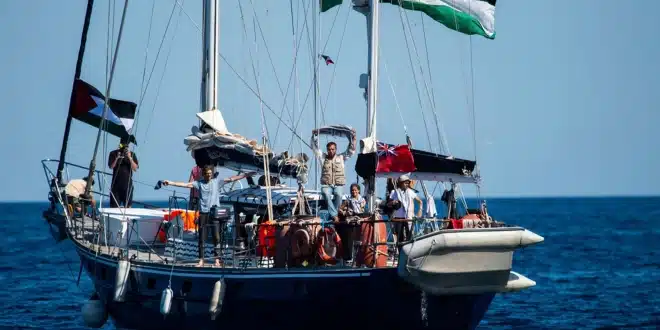Israeli naval forces intercepted a humanitarian vessel attempting to reach Gaza early Monday, halting its mission in international waters. The ship, named Madleen, was transporting a group of international activists, including Swedish climate campaigner Greta Thunberg, who sought to draw global attention to worsening humanitarian conditions in the blockaded Palestinian territory.
Interception at Sea and Diplomatic Fallout
The Freedom Flotilla Coalition, the group behind the voyage, reported that Israeli forces intercepted the vessel approximately 185 kilometers off Gaza’s coast around 4:00 a.m. local time. Video statements prepared in advance by activists anticipated this scenario. In one clip, Thunberg indicated the likelihood of interception, emphasizing the peaceful intentions of the mission and their focus on delivering food aid.
Footage released by the coalition showed Israeli forces boarding the Madleen while passengers raised their hands in a non-confrontational posture. No injuries were reported. The Israeli Foreign Ministry later stated that all activists were unharmed and would be repatriated.
The governments of Turkey and Iran condemned the operation, with Turkey characterizing it as a violation of international law and Iran labeling it a form of piracy. These reactions mirror previous criticism of Israel’s maritime enforcement, particularly following the deadly 2010 Mavi Marmara raid in which Israeli commandos killed ten Turkish activists attempting to breach the Gaza blockade.
Blockade, Aid Access, and Mounting Pressure
The Gaza Strip has been under a naval blockade enforced by Israel since 2007, with Israel asserting that the restriction is essential to prevent arms smuggling by militant groups. However, humanitarian organizations and multiple United Nations agencies have expressed concern over severe shortages of food, medicine, and fuel, especially in the wake of the ongoing war between Israel and Hamas that began in October 2023.
The Madleen’s mission coincided with mounting international criticism of Israel’s handling of aid flows. Although Israel has recently permitted limited deliveries via a newly established U.S.-backed entity known as the Gaza Humanitarian Foundation (GHF), the arrangement has drawn scrutiny. UN agencies have refused to coordinate with the GHF, citing lack of transparency and concerns over neutrality.
On the ground in Gaza, local reports indicate that distribution sites operated by GHF have been scenes of violence. Gaza’s civil defense service said that Israeli forces opened fire near one such site west of Rafah on Sunday, killing at least five civilians among ten total fatalities that day. The Israeli military claimed its soldiers were threatened and had issued warnings prior to firing. The GHF, for its part, reported no disruptions at any of its aid centers on that date.
Footage from the Nasser Hospital showed grieving families mourning loved ones killed during what was supposed to be an aid distribution. Residents described chaotic scenes and expressed fear of accessing essential supplies under current conditions.
Discovery of Hamas Leader’s Body Adds New Dimension
Separately on Sunday, the Israeli military announced it had located the body of senior Hamas figure Mohammed Sinwar in a tunnel beneath the European Hospital in Khan Yunis, a city in southern Gaza. The army stated that Sinwar was killed during an operation on May 13 but had not previously confirmed his death publicly.
Sinwar was the younger brother of Yahya Sinwar, Hamas’s top commander in Gaza and the alleged mastermind behind the October 2023 assault on Israeli territory, which left over 1,200 dead, most of them civilians. Following the deaths of multiple Hamas leaders, Israeli officials believed Mohammed Sinwar played a central role in coordinating indirect negotiations with Israel.
According to Israeli sources, intelligence materials were also recovered from the tunnel site under the hospital’s emergency ward. The military asserted that this location was being used by Hamas to shield operatives and command centers.
Since the beginning of the conflict, the Gaza Health Ministry has reported more than 54,000 Palestinian deaths, a toll that includes large numbers of civilians. The United Nations continues to treat these figures as broadly credible, citing the scale and consistency of reporting from local authorities and hospitals.
The interception of the aid vessel has reignited debate over Israel’s blockade policy, with renewed calls from humanitarian groups and political figures for expanded access to Gaza. Meanwhile, the use of hospitals and humanitarian centers in military operations remains a deeply contentious issue, as both sides in the conflict continue to exchange accusations over violations of international law.


